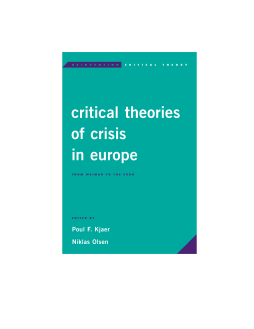
Additional Information
Book Details
Abstract
What is to be learned from the chaotic downfall of the Weimar Republic and the erosion of European liberal statehood in the interwar period vis-a-vis the ongoing Europeancrisis? This book analyses and explains the recurrent emergence of crises in European societies. It asks how previous crises can inform our understanding of the present crisis. The particular perspective advanced is that these crises not only are economic and social crises, but must also be understood as crises of public power, order and authority. In other words, it argues that substantial challenges to the functional and normative setup of democracy and the rule of law were central to the emergence and the unfolding of these crises.
The book draws on and adds to the rich ’crises literature’ developed within the critical theory tradition to outline a conceptual framework for understanding what societal crises are. The central idea is that societal crises represent a discrepancy between the unfolding of social processes and the institutional frameworks that have been established to normatively stabilize such processes. The crises at issue emerged in periods characterized by strong social, economic and technological transformations as well as situations of political upheaval. As such, the crises represented moments where the existing functional and normative grid of society, as embodied in notions of public order and authority, were severely challenged and in many instances undermined. Seen in this perspective, the book reconstructs how crises unfolded, how they were experienced, and what kind of responses the specific crises in question provoked.
Poul F. Kjaer is Professor of Business and Politics at Copenhagen Business School.
Niklas Olsen is Associate Professor of History at the SAXO-Institute, University of Copenhagen.
Europe today is not Weimar, but Weimar is not as far away as we might believe, is one of several memorable conclusions in this impressive volume which sheds historical light on today’s European crisis. Kjaer and Olsen have gathered and guided an outstanding team which provides deep and new insights on a phenomenon which accompanies modernity since early on.
Bo Stråth, Professor Emeritus in Nordic, European and World History, University of Helsinki
This book is interesting for readers who are curious about ‘the current hegemonic order’, in connection with the still ongoing crisis and in relation to the concrete historiographical practice of interdisciplinarity, beyond the dominant and exclusive specialities.
An important new set of contributions that brings historical and critical depth to the understanding of the current polymorphous yet interlocked European crises. The combination of descriptive and normative approaches, drawn from a variety of disciplinary fields (law, sociology, history and critical theory), provides a unique outlook on the structural problems and contradictions that make up Europe’s overall crisis of public power. A must-read for future studies of the European drama.
Antoine Vauchez, CNRS Research Professor, Université Paris 1-Sorbonne
Table of Contents
| Section Title | Page | Action | Price |
|---|---|---|---|
| Contents | 7 | ||
| Acknowledgements | 9 | ||
| List of Abbreviations | 11 | ||
| Introduction | 13 | ||
| Part I: Semantics, Notions and Narratives of Societal Crisis | 23 | ||
| Chapter One: What Time Frame Makes Sense for Thinking about Crises? | 25 | ||
| Chapter Two: The Stakes of Crisis | 39 | ||
| Part II: Weimar and the Interwar Period Ideologies of Antimodernism and Liberalism | 57 | ||
| Chapter Three: The Crisis of Modernity—Modernity as Crisis | 59 | ||
| Chapter Four: European Legitimacy Crises—Weimar and Today | 75 | ||
| Chapter Five: Crisis and the Consumer | 91 | ||
| Part III: The Causes of Crises from Corporatism to Governance | 109 | ||
| Chapter Six: The Constitutionalization of Labour Law and the Crisis of National Democracy | 111 | ||
| Chapter Seven: Conflict and the Crisis in Labour Law | 129 | ||
| Chapter Eight: From the Crisis of Corporatism to the Crisis of Governance | 147 | ||
| Part IV: The Euro and the Crisis of Law and Democracy | 163 | ||
| Chapter Nine: What Is Left of the European Economic Constitution II? | 165 | ||
| Chapter Ten: Reflections on Europe’s ‘Rule of Law Crises’ | 183 | ||
| Chapter Eleven: Democracy under Siege | 199 | ||
| Part V: The Consequences of Crises and the Future of Europe | 217 | ||
| Chapter Twelve: Crises and Extralegality from Above and from Below | 219 | ||
| Chapter Thirteen: ‘We Could Go Down the Road of Lebanon’ | 235 | ||
| Chapter Fourteen: Conclusions and Perspectives | 253 | ||
| Index | 261 | ||
| List of Contributors | 271 |
